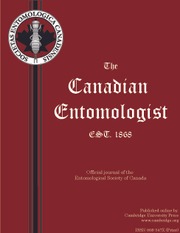Crossref Citations
This article has been cited by the following publications. This list is generated based on data provided by
Crossref.
Pimentel, David
1966.
Population Ecology of Insect Invaders of the Maritime Provinces.
The Canadian Entomologist,
Vol. 98,
Issue. 8,
p.
887.
Huffaker, C. B.
Messenger, P. S.
and
DeBach, Paul
1971.
Biological Control.
p.
16.
Huffaker, C. B.
Messenger, P. S.
and
DeBach, Paul
1971.
Biological Control.
p.
16.
Harris, P.
1973.
THE SELECTION OF EFFECTIVE AGENTS FOR THE BIOLOGICAL CONTROL OF WEEDS.
The Canadian Entomologist,
Vol. 105,
Issue. 12,
p.
1495.
Zwoelfer, H.
1973.
Possibilities and Limitations in Biological Control of Weeds.
EPPO Bulletin,
Vol. 3,
Issue. 3,
p.
19.
Drooz, A. T.
Bustillo, A. E.
Fedde, G. F.
and
Fedde, V. H.
1977.
North American Egg Parasite Successfully Controls a Different Host Genus in South America.
Science,
Vol. 197,
Issue. 4301,
p.
390.
Waage, J. K.
Smiley, J. T.
and
Gilbert, L. E.
1981.
ThePassiflora problem in Hawaii; prospects and problems of controlling the forest weedP. Mollissima [Passifloraceae] with heliconiine butterflies.
Entomophaga,
Vol. 26,
Issue. 3,
p.
275.
Waage, J. K.
and
Hassell, M. P.
1982.
Parasitoids as biological control agents – a fundamental approach.
Parasitology,
Vol. 84,
Issue. 4,
p.
241.
Fedde, Vicki H.
Fedde, G. F.
and
Drooz, A. T.
1982.
Factitious hosts in insect parasitoid rearings.
Entomophaga,
Vol. 27,
Issue. 4,
p.
379.
Quimby, P. C.
and
Walker, H. L.
1982.
Pathogens as Mechanisms for Integrated Weed Management.
Weed Science,
Vol. 30,
Issue. S1,
p.
30.
Hokkanen, Heikki
and
Pimentel, David
1984.
NEW APPROACH FOR SELECTING BIOLOGICAL CONTROL AGENTS.
The Canadian Entomologist,
Vol. 116,
Issue. 8,
p.
1109.
Hoy, Marjorie A.
1985.
Biology Control in Agriculture Ipm System.
p.
151.
Hokkanen, Heikki
1985.
Exploiter-victim relationships of major plant diseases: Implications for biological weed control.
Agriculture, Ecosystems & Environment,
Vol. 14,
Issue. 1-2,
p.
63.
Dharmadhikari, P. R.
Ramaseshiah, G.
and
Achan, P. D.
1985.
Survey ofLymantria obfuscata and its natural enemies in India.
Entomophaga,
Vol. 30,
Issue. 4,
p.
399.
Hokkanen, Heikki M. T.
and
Sailer, Reece I.
1985.
Success in classical biological control.
Critical Reviews in Plant Sciences,
Vol. 3,
Issue. 1,
p.
35.
Pimentel, D.
1986.
Ecology of Biological Invasions of North America and Hawaii.
Vol. 58,
Issue. ,
p.
149.
Wingfield, Michael J.
1987.
Fungi Associated with the Pine Wood Nematode, Bursaphelenchus Xylophilus, and Cerambycid Beetles in Wisconsin.
Mycologia,
Vol. 79,
Issue. 2,
p.
325.
Flanders, R. V.
and
Oatman, E. R.
1987.
Competitive interactions among endophagous parasitoids of potato tuberworm larvae in Southern California.
Hilgardia,
Vol. 55,
Issue. 1,
p.
1.
1988.
Biological control: challenges and opportunities.
Philosophical Transactions of the Royal Society of London. B, Biological Sciences,
Vol. 318,
Issue. 1189,
p.
111.
McKillup, S. C.
Allen, P. G.
and
Skewes, M. A.
1988.
The natural decline of an introduced species following its initial increase in abundance; an explanation for Ommatoiulus moreletii in Australia.
Oecologia,
Vol. 77,
Issue. 3,
p.
339.

